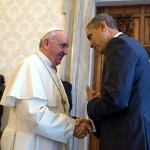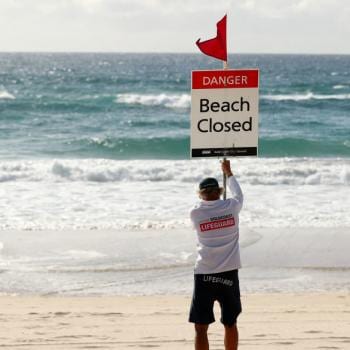Lots of explanations still buzzing around the interweb on Pope Francis’ visit to the United States. One that caught my eye was a defense of the pope from conservatives who think Francis is too liberal and too political to stand up appropriately for Christian norms:
When Pope Francis engages in this dialogue on subjects of great interest to the secular and largely anti-Catholic American left, he is in a way employing the Socratic method and forcing secular liberals to ask the question: “Why?” Why do we care about conservation of natural resources? Why do we care about feeding the homeless? Why do we care about the plight of immigrants and refugees? As Pope Francis has alluded, technology allows people to make a superficial show of enthusiasm, emotion, or sympathy for these popular causes, but how many have asked themselves about the deeper ethical and moral propositions that are implied by such frothy sentimentalism? The entire history of Western Civilization cannot be summarized in 140 characters, much less a lame hashtag.
As an example, environmentalists often ask the question, “What kind of world do we want to leave for our children?” Before we can get there though, we should start by asking what kind of world we want to make for our children today. In his address to Congress, Pope Francis said, “I also want to dialogue with all those young people who are working to realize their great and noble aspirations, who are not led astray by facile proposals, and who face difficult situations, often as a result of immaturity on the part of many adults.” Where we see the decay of infrastructure and of morals, it is because the family is being assaulted and destroyed by our popular culture, our laws, and most of all, by our own apathy and laziness.
The odd aspect of this explanation and also of Pope Francis’ message is a failure to mention grace. If Christianity is right about human nature, why wouldn’t we expect people to behave badly either by exploiting natural resources or using markets for illegitimate gain? And if Roman Catholicism is right about the nature of the sacraments, about the power of God in those rites, and about the virtues that attend faith, then why not appeal to life in the church as the way to curb greed and save the planet? Isn’t it the case that if you save enough people, then substantial changes in behavior would follow — from carbon footprints to consumerism.
This isn’t to suggest that this Protestant agrees with Roman Catholicism’s understanding of salvation. But if we really want people to stop being selfish and live more humanely, don’t Christians (Protestants and Roman Catholics) think the path to selflessness comes in following Christ? So wouldn’t it have made sense for the Pope to have said that when he was speaking on such visible platforms?












